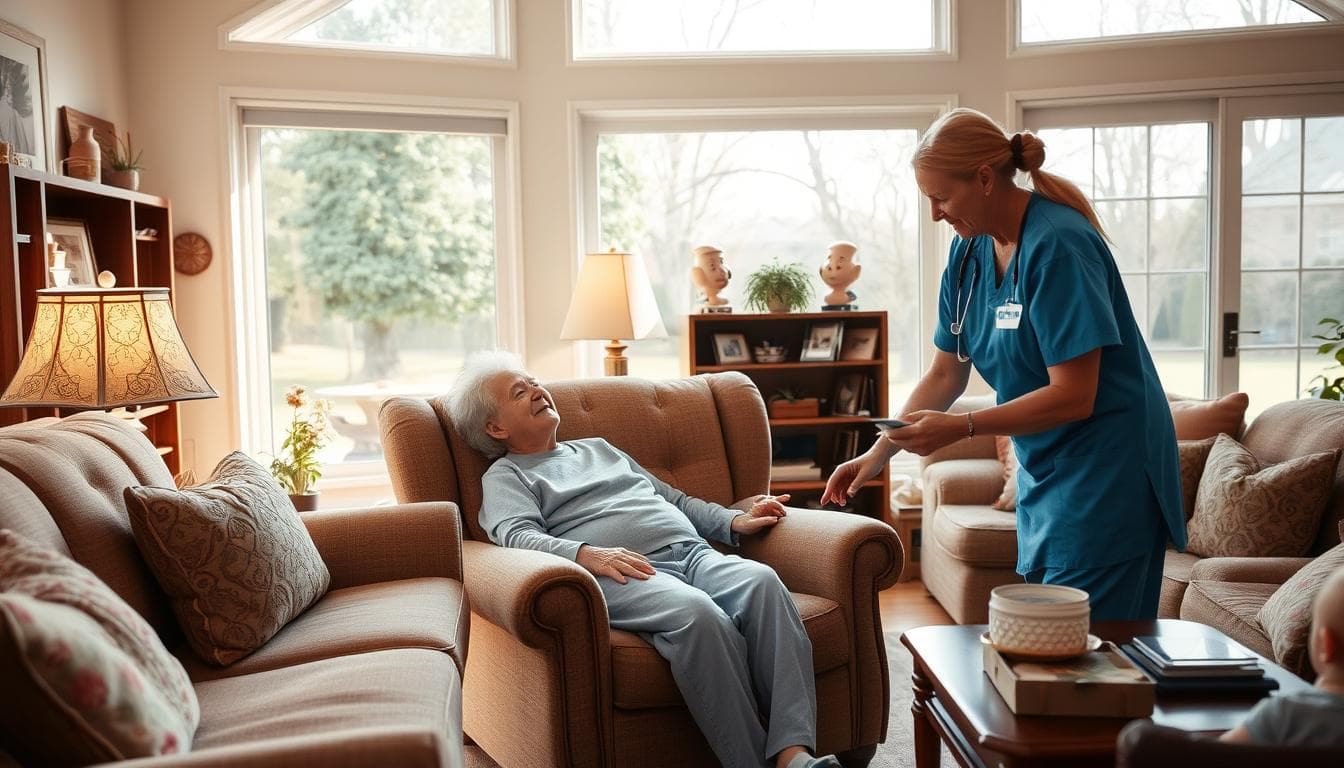
Everything You Need to Know About Live-In Home Nursing Care
A comprehensive guide to live-in home nursing services, their benefits, and the conditions that require this specialized care at home.
Everything You Need to Know About Live-In Home Nursing Care
Live-in home nursing is a specialized medical service provided to patients in their homes, allowing them to receive necessary medical care in a comfortable and familiar environment.
Live-in home nursing is considered an ideal option for patients who need continuous care, such as elderly individuals or people with disabilities.

Home care not only provides comfort for patients but also contributes to improving their quality of life and reducing the need for hospital stays.
Key Highlights
- Live-in home nursing provides specialized medical care at home
- Improves quality of life for patients and their families
- Reduces the need for hospital stays
- Is an ideal option for elderly and disabled individuals
- Provides a comfortable and familiar environment for patients
What is Live-In Home Nursing Care?
Live-in home nursing is defined as a type of healthcare provided to patients in a home environment. This type of care meets the needs of patients who require continuous medical care and nursing.
The Difference Between Live-In Nursing and Intermittent Visits
Live-in home nursing differs from intermittent visits in that it provides continuous care for patients around the clock. While intermittent visits are limited to specific time periods during the day.
This means that live-in home nursing can meet the needs of patients who require continuous medical care and nursing.
History of Home Nursing Services Development
Home nursing services have a long history dating back decades. With the development of healthcare, home nursing services have also evolved to better meet patient needs.
Today, these services have become more advanced and specialized, providing advanced medical and nursing care in a home environment.
Benefits of Live-In Home Nursing Services
Healthcare at home provides psychological comfort and physical well-being for patients. This type of care meets patients' needs in a personal and more comfortable way in a familiar home environment.

Psychological Comfort for the Patient
Live-in home nursing provides the patient with a comfortable and familiar environment, reducing anxiety and stress resulting from being in the hospital. This type of care allows the patient to maintain their daily routine, enhancing their sense of psychological comfort.
Psychological comfort for the patient is considered an important aspect of the healing process. When the patient feels comfortable, their response to treatment improves, and potential complications decrease.
Relieving the Burden on Family Members
Live-in home nursing services are not limited to providing medical care for the patient only, but also help relieve the burden on family members. When a specialized nurse takes care of the patient, family members can focus on providing emotional and social support instead of bearing the full care burden.
This distribution of responsibilities enhances the quality of life for family members, allowing them to continue their daily lives normally while knowing that the patient is receiving necessary care.
Reducing Infection Risks Compared to Hospitals
Live-in home nursing reduces the infection risks that patients may face in hospitals. The home environment is more controlled in terms of cleanliness and sterilization, reducing the risk of hospital-acquired infections.
Reducing infection risks enhances patient safety and contributes to faster recovery. Avoiding infections also reduces the need for antibiotics, which decreases bacterial resistance to antibiotics.
Conditions Requiring Live-In Home Nursing
There are many conditions that require home nursing care to provide necessary care. These conditions include a wide range of health needs that require continuous and specialized care.

Elderly and Special Needs Individuals
Elderly individuals and those with special needs often require continuous care. Live-in home nursing can provide them with support in daily activities such as eating, bathing, and medication management. It can also provide necessary medical care to monitor their health conditions and provide appropriate treatment.
- Providing support in daily activities
- Monitoring health condition and providing treatment
- Providing psychological comfort and emotional support
Post-Surgical Patients
Post-surgical patients need special care to ensure proper recovery and avoid complications. Live-in home nursing can provide necessary care for wound monitoring, pain management, and guidance on recovery.
Post-surgical care includes:
- Wound monitoring and dressing changes
- Pain and medication management
- Providing guidance on recovery and necessary exercises
Chronic Diseases and Critical Conditions
Chronic diseases such as diabetes, heart disease, and cancer require continuous care. Live-in home nursing can provide necessary care to manage these conditions, including symptom monitoring, medication management, and emotional support.
Comprehensive Home Nursing Services
Live-in home nursing is characterized by providing comprehensive and integrated care for patients in their homes. These services are not limited to medical care only but also include assistance with daily activities and regular health monitoring.

Basic Medical Care
Basic medical care in home nursing includes many important aspects:
Measuring and Monitoring Vital Signs
Vital signs such as blood pressure, pulse, and temperature are measured regularly to ensure the patient's health stability.
Medication Administration According to Schedule
Nurses ensure that medications are given to the patient at specified times according to the doctor's prescribed schedule.
Regular Health Condition Follow-up
Regular health condition follow-up is an integral part of home nursing services. The patient's condition is evaluated regularly and the care plan is updated accordingly.
Assistance with Daily Activities
Home nursing services are not limited to medical care only but also include assistance with daily activities:
Personal Hygiene and Bathing
Nurses help patients maintain their personal hygiene, including bathing and dressing.
Assistance with Eating and Nutrition
Nurses help patients with eating and providing proper nutrition according to their needs.
| Service | Description |
|---|---|
| Basic Medical Care | Includes measuring vital signs and medication administration |
| Regular Follow-up | Patient condition assessment and care plan updates |
| Daily Activities Assistance | Includes personal hygiene and eating |
Qualifications and Experience of Live-In Home Nurses
Live-in home nurses play a crucial role in providing medical and personal care for patients in their homes. This role requires a combination of academic qualifications and personal skills.

Required Certificates and Licenses
The live-in home nurse must hold a nursing degree from a recognized institution. Additionally, they must have a license to practice nursing in the area where they work. The license ensures that the nurse has the necessary knowledge and skills to provide safe and effective care.
Necessary Personal Skills
In addition to academic qualifications, the live-in home nurse must possess strong personal skills. These skills include:
Empathy and Patience
The nurse must be able to empathize with patients and their families, and show patience in dealing with difficult cases. Empathy and patience contribute to building a trust relationship between the nurse and patient.
Effective Communication Skills
Effective communication is the key to success in home nursing. The nurse must be able to communicate clearly with patients and their family members, as well as with the medical team. Good communication reduces misunderstandings and improves care quality.
Continuous Training and Professional Development
The live-in home nurse must participate in continuous training programs to update their skills and knowledge.
"Continuous training is the foundation of providing high-quality care in the field of home nursing."
This includes attending training courses and medical conferences, and staying updated with the latest research and practices in healthcare.
How to Choose Suitable Home Nursing Services
Choosing nursing services that are suitable requires a comprehensive understanding of the patient's needs and care requirements. When searching for home nursing services, several factors must be considered to ensure choosing a service that fully meets the patient's needs.
Criteria for Evaluating Home Nursing Companies
Evaluating home nursing companies requires looking at several important criteria. First, the qualifications and experience of nurses working in the company must be verified. It must also be ensured that the company provides comprehensive services that match the patient's needs. Additionally, previous customer reviews and their satisfaction with the services provided should be considered.
Emergency policies and alternatives provided by the company in case of need for additional or emergency care should also be verified.
Important Questions to Ask Before Contracting
Before contracting with a home nursing company, several important questions should be asked to ensure choosing the appropriate service. Among these questions:
- What are the qualifications and experience of nurses working in the company?
- What are the emergency policies and available alternatives in case of need for additional care?
Inquiring About Nurses' Experience
The nurses' experience and their qualification to handle similar cases should be inquired about. The certificates and licenses held by nurses should also be verified.
Clarifying Emergency Policies and Alternatives
Emergency policies and alternatives provided by the company should be understood. The procedures followed in case of emergencies and how to communicate with the company in such cases should be known.
Reading Previous Customer Reviews
Reading previous customer reviews is considered an important step in evaluating the quality of services provided. Through them, customer satisfaction with the service can be understood and any problems they may have faced can be discovered.
| Criteria | Important Questions | Importance of Reviews |
|---|---|---|
| Nurses' Qualifications | What are the nurses' qualifications? | Experience evaluation |
| Emergency Policies | What are the emergency policies? | Response evaluation |
| Customer Reviews | What are previous customers' experiences? | Overall satisfaction evaluation |
Watch: Home Nursing Care and Medical Services for Elderly Care
Educational video about live-in home nursing services - This video provides a comprehensive overview of home care services and how to provide specialized care in the comfort of home 24/7.
Conclusion
In conclusion, live-in home nursing plays an important role in caring for various health conditions. Through providing continuous and specialized care, the quality of life for patients and their families can be improved.
If you are considering getting live-in home nursing services, do not hesitate to contact us for a free consultation about the best services available for your condition or that of a family member.
For more information about our services, you can visit our home medical services page or read more of our medical articles.
Additional Resources:
This article is for general information purposes only and is not a substitute for specialized medical consultation.
Additional Information
Need Help?
Our specialized medical team is available to provide assistance and medical consultations


